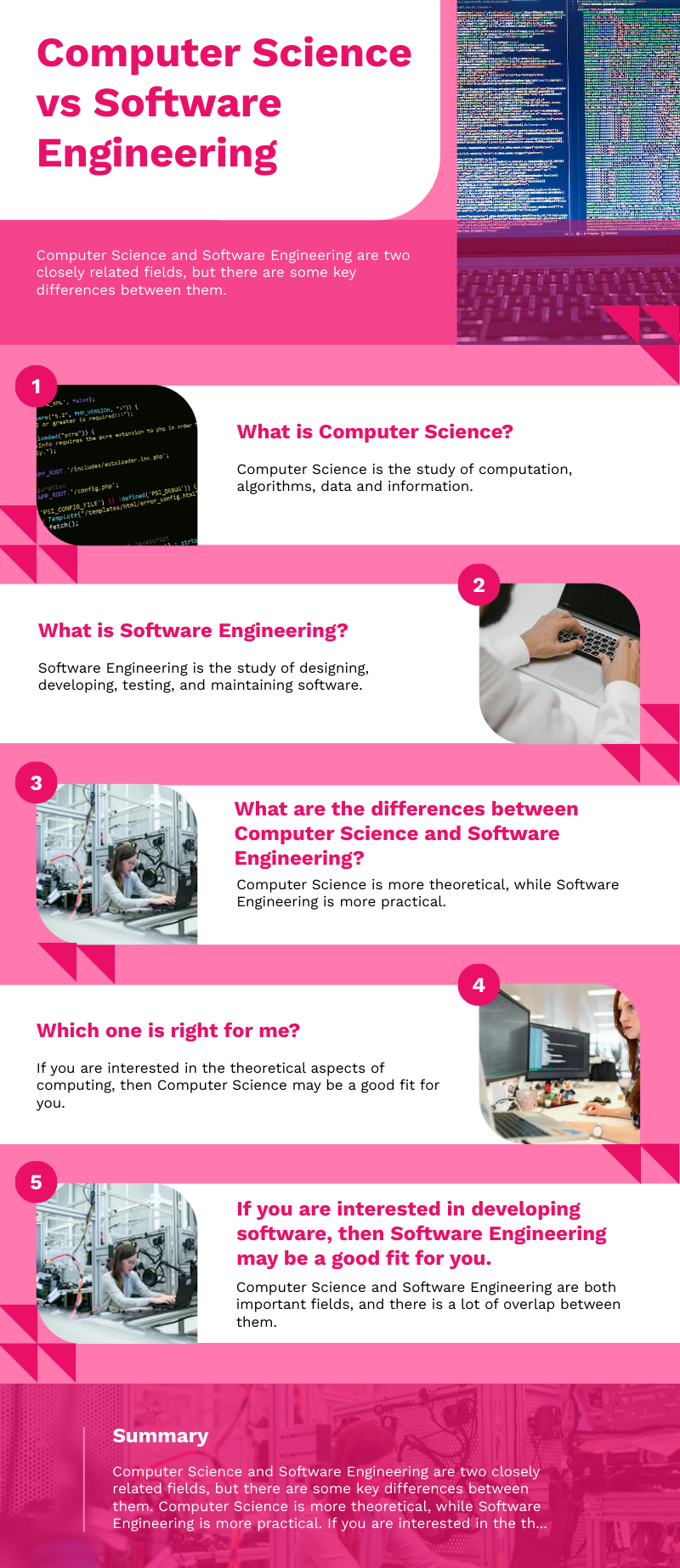Computer Science explores theory and algorithms, while Software Engineering focuses on practical application, design, and development of software systems.
Did you know that computer science and software engineering are distinct fields with unique focuses and opportunities? While they are often used interchangeably, there are significant differences between the two. Let’s dive into the comparison and shed light on why it matters.
Key Takeaways:
- Computer science and software engineering are distinct fields with different areas of focus.
- Computer science provides a broad understanding of computers, algorithms, and emerging technologies.
- Software engineering focuses on the practical skills of software development and problem-solving.
- Both fields offer various career opportunities, but computer science provides more versatility.
- Deciding between the two depends on individual interests and desired focus of study.
What is Computer Science?

Computer science is an academic discipline that encompasses the study of computers, software systems, and computational processes. It explores the theoretical foundations of computing, algorithms, and the integration of emerging technologies like AI and machine learning.
Computer science students learn programming languages, data structures, cybersecurity, and database management. This field provides a broad understanding of computers and their applications in various industries.
Computer Science Overview
Computer science is a versatile field that covers a wide range of topics, including:
- Computer theory and architecture
- Algorithms and data structures
- Artificial Intelligence (AI) and machine learning
- Database management
- Cybersecurity
- Software development
Computer science explores the fundamental principles and theories behind computing, enabling students to develop critical thinking and problem-solving skills.
Computer Science Field of Study
Computer science is a broad field of study that offers various specializations and career paths, including:
| Specialization | Description | Potential Careers |
|---|---|---|
| Artificial Intelligence | Focuses on the development of intelligent machines and systems that can perform tasks that typically require human intelligence. | AI engineer, machine learning engineer, data scientist |
| Software Engineering | Emphasizes the design, development, and maintenance of software systems, including software architecture, testing, and quality assurance. | Software engineer, software developer, software architect |
| Data Science | Explores the extraction of meaningful insights from large and complex datasets using statistical analysis, machine learning, and visualization techniques. | Data scientist, data analyst, data engineer |
| Cybersecurity | Focused on protecting computer systems, networks, and data from unauthorized access, cyber attacks, and other security threats. | Cybersecurity analyst, security engineer, ethical hacker |
These are just a few examples of the many specializations within computer science. Each specialization offers unique opportunities for research, innovation, and career growth.
What is Software Engineering?
Software engineering is a discipline within computer science that focuses on the design, development, and maintenance of software systems. It applies engineering principles and practices to create high-quality software products. Software engineering encompasses a wide range of activities, including gathering requirements, analyzing user needs, designing software architecture, coding, testing, and maintaining software systems.
A software engineering field of study equips students with the skills and knowledge necessary to excel in the software development industry. Students learn about software development methodologies, such as agile and waterfall, as well as programming languages like Java, C++, and Python. They also gain an understanding of algorithms, data structures, software testing techniques, and software project management.
Principles of Software Engineering:
- Software development methodologies
- Programming languages and frameworks
- Algorithm design and analysis
- Data structures
- Software testing and quality assurance
- Software project management
Software engineers apply these principles to develop efficient, reliable, and scalable software solutions. They collaborate with other team members, such as software developers, designers, and project managers, to ensure successful software delivery. In addition to technical skills, software engineers also need strong problem-solving, communication, and teamwork abilities to excel in their field.
Differences in Degree Focus
When comparing computer science and software engineering degrees, it’s important to understand their different areas of focus. While computer science degrees offer a broader curriculum, covering a wide range of topics such as computer theory, algorithms, AI, machine learning, and cybersecurity, software engineering degrees have a more practical focus, emphasizing the design and development of software systems.
In computer science, students delve into the theoretical foundations of computing, exploring concepts that underpin the field. They learn about algorithms, data structures, and emerging technologies that are shaping the future of computer science. This degree program aims to equip students with a deep understanding of computers and their applications in various industries, preparing them for a wide range of roles in the field.
On the other hand, software engineering degrees place a stronger emphasis on practical skills. Students learn software development methodologies, programming languages, and software testing techniques. The curriculum is designed to develop their problem-solving abilities, project management skills, and proficiency in creating robust software systems. Software engineering programs focus on preparing students for the challenges of real-world software development.
While both computer science and software engineering programs cover programming skills, computer science programs typically delve deeper into theoretical concepts, while software engineering programs provide a stronger practical foundation in software development. Choosing the right degree program depends on an individual’s interests and career goals, whether they prefer a more theoretical or a more applied approach.
| Computer Science Degree Focus | Software Engineering Degree Focus |
|---|---|
| Computer theory | Design and development of software systems |
| Algorithms | Software development methodologies |
| AI and machine learning | Programming languages |
| Cybersecurity | Software testing |
Career Opportunities in Computer Science
Graduates with a degree in computer science have a wide range of career opportunities. The rapidly evolving field of computer science offers diverse job prospects in various industries, including technology, finance, healthcare, and government. Professionals with strong programming and problem-solving skills are in high demand in the computer science job market.
Computer Science Job Roles
- Software Developer: Design and develop software applications.
- Web Developer: Create and maintain websites and web applications.
- Data Scientist: Analyze complex data and provide insights for businesses.
- Cybersecurity Analyst: Protect computer systems and networks from security breaches.
- IT Specialist: Handle technical issues and support computer systems in organizations.
Computer Science Job Prospects
The job prospects in computer science are promising. With advancements in technology, organizations across industries are increasingly relying on computer science professionals to drive innovation and enhance their digital capabilities. The demand for computer science graduates is expected to continue growing in the coming years.
Computer Science Job Market
The computer science job market offers numerous career paths and opportunities for growth. From startups to multinational corporations, organizations of all sizes require computer science professionals to develop and maintain their software systems, analyze data, and ensure the security of their digital infrastructure. As technology continues to evolve, computer science professionals will play a crucial role in shaping the future of various industries.

Career Opportunities in Software Engineering
Software engineering graduates have a wide array of career opportunities in the ever-expanding field of software development. With their expertise in designing and building software systems, software engineers are in high demand and can choose from various job roles. Here are some of the exciting career paths available in software engineering:
- Software Engineer: As a software engineer, you will be responsible for developing, testing, and maintaining software systems. You will work closely with clients and stakeholders to understand their requirements and create efficient software solutions that meet their needs.
- Mobile App Developer: In this role, you will specialize in developing applications for mobile devices, such as smartphones and tablets. You will use programming languages like Java, Swift, or Kotlin to create user-friendly and innovative mobile apps.
- Quality Assurance Engineer: As a quality assurance engineer, you will ensure that software products meet the highest standards of quality. You will create and execute test plans, identify and report software defects, and collaborate with the development team to resolve issues.
- Database Administrator: Database administrators play a crucial role in managing and organizing data within an organization. You will design, implement, and maintain databases, ensuring data integrity, security, and optimal performance.
- Software Development Director: In this leadership position, you will oversee and manage software development projects. You will coordinate teams, set project goals and timelines, and ensure that software products are delivered on time and within budget.
The software engineering job market is flourishing, with a strong demand for skilled professionals. As technology continues to advance, the need for software engineers who can develop innovative solutions and solve complex problems is increasing. This presents excellent job prospects for aspiring software engineers, with a wide range of industries seeking their expertise.
| Job Role | Average Salary |
|---|---|
| Software Engineer | $110,140 per year |
| Mobile App Developer | $105,240 per year |
| Quality Assurance Engineer | $88,550 per year |
| Database Administrator | $98,860 per year |
| Software Development Director | $152,860 per year |
Salary Comparison: Computer Science vs Software Engineering
When considering a career in either computer science or software engineering, one important factor to consider is the potential salary. Salaries in these fields can vary based on factors such as experience, location, and job role.
Generally, computer science graduates have higher earning potential due to the versatility of their skill set and the broader range of job opportunities available to them. According to the Bureau of Labor Statistics, the median salary for computer and information research scientists, which is a computer science-related role, is higher than the median salary for software developers, which is a software engineering-related role.
| Job Role | Median Salary |
|---|---|
| Computer and Information Research Scientists (Computer Science) | $122,840 per year |
| Software Developers (Software Engineering) | $110,140 per year |
It’s important to note that these median salary figures are approximate and can vary based on factors such as industry, company size, and individual qualifications. Additionally, as professionals gain experience and specialize in specific areas, their earning potential can increase significantly.
Ultimately, when considering a career in computer science or software engineering, it’s crucial to not only consider salary but also individual interests, career goals, and the desired focus of study.
Necessary Skills and Education Paths
Both computer science and software engineering require strong programming skills. In computer science, students need to have a deep understanding of algorithms, data structures, and programming languages. They also need to be analytical and have strong problem-solving skills. On the other hand, software engineering students should have a solid foundation in software development methodologies, programming languages, and software testing. They need to be detail-oriented and have good teamwork and communication skills.
When it comes to education, both fields typically require a bachelor’s degree. However, higher-level positions in both computer science and software engineering may require a master’s degree. It’s important for aspiring professionals in these fields to pursue a formal education to gain the necessary knowledge and skills.
Computer Science Skills:
- Proficiency in programming languages like Python, Java, C++, and JavaScript
- Strong understanding of algorithms and data structures
- Knowledge of computer architecture and operating systems
- Familiarity with artificial intelligence, machine learning, and data analysis
- Problem-solving and analytical thinking
Computer Science Education Requirements:
| Degree Level | Education Requirements |
|---|---|
| Bachelor’s Degree | Major in computer science or related field |
| Master’s Degree | Optional, but can enhance career prospects and opportunities for advanced roles |
Software Engineering Skills:
- Proficiency in programming languages like Java, C++, Python, and Ruby
- Knowledge of software development methodologies such as Agile and Scrum
- Experience with software testing and quality assurance
- Understanding of software architecture and design patterns
- Excellent teamwork and communication skills

Software Engineering Education Requirements:
| Degree Level | Education Requirements |
|---|---|
| Bachelor’s Degree | Major in software engineering or related field |
| Master’s Degree | Optional, but can provide advanced knowledge and specialized expertise |
Conclusion
In conclusion, computer science and software engineering are distinct fields that offer different areas of focus and career opportunities. Computer science provides a broad understanding of computers, algorithms, and emerging technologies, while software engineering emphasizes practical skills in software development.
Both fields have a growing job market and offer various career paths. Graduates with a computer science degree can pursue opportunities as software developers, web developers, data scientists, cybersecurity analysts, and IT specialists. On the other hand, software engineering graduates can explore careers as software engineers, mobile app developers, quality assurance engineers, database administrators, and software development directors. The demand for professionals in both fields is high, making it an exciting time to enter the technology industry.
When deciding between computer science and software engineering, individual interests, career goals, and the desired focus of study play a crucial role. Those interested in the theoretical foundations of computing and exploring emerging technologies may find computer science to be a better fit. Conversely, individuals interested in practical application and problem-solving in software development may prefer software engineering. Ultimately, both fields offer rewarding careers and opportunities to make a significant impact in the ever-evolving world of technology.
FAQ
What is the difference between computer science and software engineering?
Computer science provides a broad understanding of computers, algorithms, and emerging technologies, while software engineering focuses on the design and implementation of software systems.
What is computer science?
Computer science is an academic discipline that encompasses the study of computers, software systems, and computational processes. It explores theoretical foundations, programming languages, and cybersecurity.
What is software engineering?
Software engineering is a subset of computer science that focuses on designing, developing, and maintaining software systems. It emphasizes the practical aspects of software development and problem-solving.
How do the degree focuses differ in computer science and software engineering?
Computer science degrees have a broader focus, covering topics like computer theory, algorithms, AI, and cybersecurity. Software engineering degrees focus more on the design and development of software systems.
What are the career opportunities in computer science?
Computer science graduates can work as software developers, web developers, data scientists, cybersecurity analysts, and IT specialists. They have diverse job opportunities across industries.
What are the career opportunities in software engineering?
Software engineering graduates can pursue careers as software engineers, mobile app developers, quality assurance engineers, database administrators, and software development directors.
How do the salaries compare between computer science and software engineering?
Salaries vary based on factors like experience and job role. Generally, computer science graduates have higher earning potential due to the versatility of their skill set and the broader range of job opportunities available.
What skills and education paths are necessary for computer science and software engineering?
Both fields require strong programming skills. Computer science students need a deep understanding of algorithms and data structures, while software engineering students should have a solid foundation in software development methodologies and programming languages.
Source Links
- https://csweb.rice.edu/academics/graduate-programs/online-mcs/blog/computer-science-vs-software-engineering
- https://www.northcentralcollege.edu/news/2022/09/13/computer-science-vs-software-engineering
- https://www.uopeople.edu/blog/computer-science-vs-software-engineering/
Image Credits
Featured Image By – Innova Labs from Pixabay
Image 1 By – Freepik
Image 2 By – Freepik








